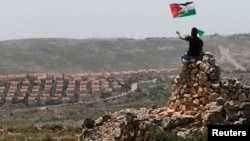JERUSALEM —
Reaction has been cautious in Israel and the Palestinian territories to the Arab League announcement that it supports the idea of using land swaps to negotiate future Israeli-Palestinian borders as part of a Middle East peace agreement. Arab ministers announced the position after a meeting in Washington Tuesday.
Israeli officials expressed mixed reactions to the Arab League announcement that it would accept what it called minor and comparable land swaps to encourage the stalled Mideast peace negotiations.
Israel's head negotiator for the talks, Justice Minister Tzipi Livni, called it positive news that sent a message to the Israeli public.
She said they need to return to the negotiating table as soon as possible and they certainly welcome the message from the Arab League. Israeli opposition leaders also expressed support for the proposal.
Prime Minister Benjamin Netanyahu's response was more reserved. He told senior officials Wednesday that the root of the conflict is not territory but rather the Palestinian unwillingness to recognize the state of Israel.
The Palestinians' chief negotiator, Saeb Erekat, said the Arab League announcement contained nothing new.
In a statement, he said it represented the official Palestinian position - as was summarized Tuesday by the head of the Arab League delegation, Qatar's Prime Minister Sheikh Hamad Bin Jassem al-Thani.
“Agreement should be based on the two-state solution on the basis of the 4th of June 1967 lines with the possibility of comparable and mutually agreed minor swaps of the land," he said.
The statement underscores the position of Palestinian Authority President Mahmoud Abbas that any negotiations should begin from the borders that existed before the 1967 Arab-Israeli War.
Israel's Prime Minister Netanyahu says those borders are not defensible for his country.
The Israeli-Palestinian peace talks have been stalled for several years. The Palestinians say they could only resume if Israel stops construction of Jewish settlements in Palestinian territories and releases all political prisoners.
The Israelis say the Palestinians should return to the negotiating table without preconditions.
A political analyst with the Al-Monitor website, Akiva Eldar, says nevertheless the Arab League statement gives hope for a new approach to the conflict.
“The statement of the Arab League by the Qatari prime minister is a clear indication that the Arab League is involved in the peace process and that there is a hope for a new American strategy that looks at the Israeli-Palestinian conflict in a kind of regional perspective," he said.
The head of East Jerusalem's International Peace Cooperation Center, Rami Nasrallah, agreed, to a degree.
“This accepting a principle which was discussed before, it's been agreed now by the Arab countries, I think this is a good start if it's not a great hope," he said.
Eldar explains a reason for Netanyahu's measured response.
“For [Netanyahu], the fact that the Arab League has agreed to a territorial swap doesn't mean anything because he doesn't see the '67 lines as the basis for this swap," he said.
Eldar notes that nearly one-half million Israeli settlers now live in East Jerusalem and the West Bank. It would be difficult for any Israeli government to displace those living in the major settlements.
And he says that since the Israeli elections in January, parties representing Jewish settlers and others who oppose giving up the Palestinian territories have become important partners in Netanyahu's coalition government.
Analyst Nasrallah says the Arab League announcement could eventually help the peace process because it could give it legitimacy and allow the Arab world to be a part of any solution.
“Establishing normal diplomatic relations between Israel and the Arab states is something important which could build the trust after reaching a permanent status agreement," he said.
Nevertheless, both experts agree that the main obstacles to resuming the peace talks are the positions of the Israeli and Palestinian negotiators. And they say these will have to change before any real progress can be made.




